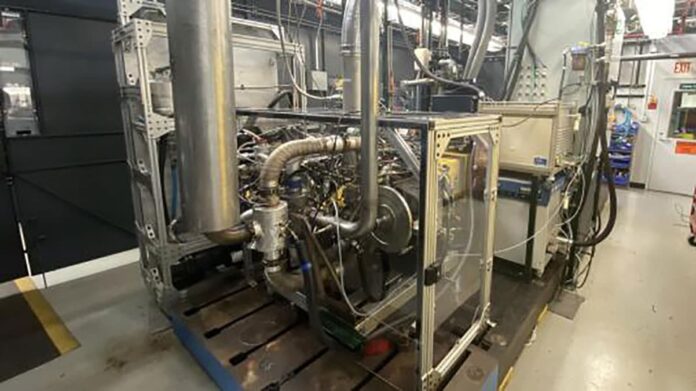Invented over a century ago, the opposed-piston engine was primarily used during World War II to power submarines and aircraft carriers due to its exceptional fuel efficiency. Despite its advantages, the engine never became popular on a larger scale due to tightening emissions standards.
In recent years, advancements in technology and engineering have strengthened its potential role in a zero-carbon transportation system.
The U.S. Department of Energy’s Argonne National Laboratory has partnered with Achates Power to develop a hydrogen-powered engine for long-haul commercial vehicles using the opposed-piston, two-stroke compression ignition engine design. The team recently began testing the hydrogen-powered engine in a groundbreaking demonstration that showed promising results.
“For the first time at Argonne, we demonstrated that the opposed-piston engine can run on hydrogen and produce power,” El-Hannouny said. “We are in the early stages, but the testing provides the data we need to make changes to the combustion mode or other parts of the engine to improve performance.”
Hydrogen is a versatile fuel that can be produced from low- and no-carbon resources, making it an eco-friendly option. Argonne has been at the forefront of hydrogen research and technology for years. Their research facilities include a single-cylinder opposed-piston engine platform with a newly designed and optimized combustion chamber for medium- and heavy-duty engine research. They are top-notch and include a hydrogen delivery and storage system.
“In partnering with Argonne, we can explore some of the combustion concepts developed at Achates. We can make refinements based on data generated during testing. Our goal is to develop an efficient, cost-effective hydrogen combustion opposed-piston engine that could be transformational for the transportation industry,” Fromm said.
“This is not a completely new idea. But recent technologies like electronic controls, electronic fuel injection, and sensors that provide critical feedback can be applied to advance the opposed-piston engines of today,” said Douglas Longman, Argonne’s group manager, Advanced Power Systems Research. “The opposed-piston engine has an enormous potential for decarbonization by running on hydrogen fuel.”
When it comes to hydrogen combustion, the advanced opposed-piston engine definitely has many benefits compared to conventional engines. One of the most notable advantages is the simplicity of its design. Achates Power’s unique piston architecture involves two pistons moving in opposition within a single cylinder. This eliminates the need for cylinder heads, which are a common source of inefficiency and heat loss in traditional engines.
The opposed-piston engine’s unique two-stroke combustion cycle generates twice as many power strokes per crankshaft revolution as a standard four-stroke engine, leading to increased power. Additionally, the engine is lighter, less costly, and simpler to construct.
Although electric vehicles (EVs) have gained widespread popularity in the zero-carbon transportation market for cars, the hydrogen-powered opposed-piston engine can play a crucial role in powering hard-to-electrify vehicles that travel long distances.
“Hydrogen may be the best fuel for truly sustainable long-haul transportation,” El-Hannouny said. “Argonne’s successful demonstration with carbon-free hydrogen combustion will be an important step toward decarbonizing the mid-duty, heavy-duty freight sector.”
Achates is targeting its hydrogen-powered engine for medium- to large-size commercial trucks, off-road vehicles for industries like mining and agriculture, and military vehicles.
Achates will update its computer models with the combustion and emission data generated during initial testing. The goal is to use computer modeling to optimize the engine’s design and improve combustion strategies. Achates engineers are working closely with Argonne to ensure the engine’s calibration and monitoring.
“Our goal is to demonstrate the capability of the opposed-piston engine to run hydrogen and reach the efficiency, power density, and torque of diesel-powered engines; at the same time, we are eliminating greenhouse gas emissions,” Huo said.
Fromm said that Argonne’s expertise and state-of-the-art facilities are critical to bringing the Achates hydrogen-powered engine into the marketplace.
“Achates has been working with Argonne for over a decade, and they are the perfect partner for this project,” Fromm said. “Argonne has extensive experience with hydrogen combustion. And not just on opposed-piston engines but on conventional engines as well. Argonne’s unique capabilities and depth of experience are essential to the success of the project.”
